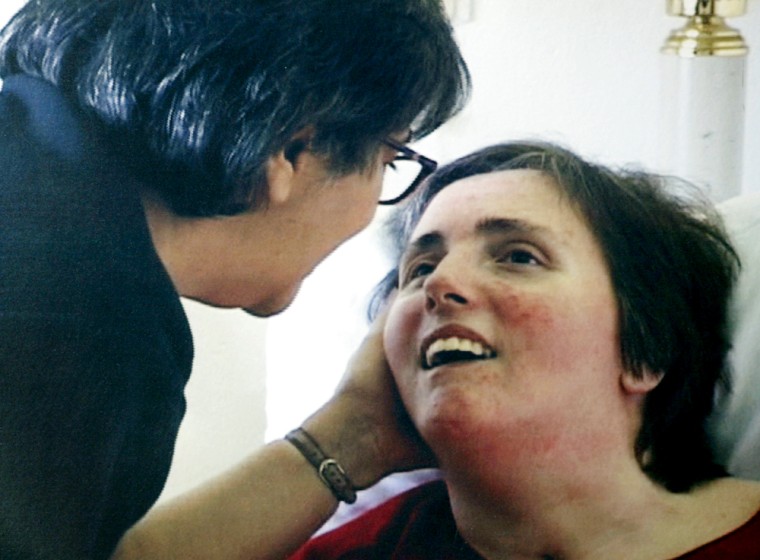Dealing a defeat to Gov. Jeb Bush, the Florida Supreme Court on Thursday struck down a law that was rushed through the Legislature last fall to keep a severely brain-damaged woman hooked to a feeding tube.
The seven-member court unanimously said Bush and lawmakers improperly tried to pull an end run around the court system in the case of Terri Schiavo, who has been at the center of a long and bitter right-to-die dispute that pits her husband against his in-laws.
As early as 2000, lower courts had ruled that Michael Schiavo could have his wife’s feeding tube removed. But last October, the Legislature passed “Terri’s Law” to override the courts, and Bush quickly invoked it to order the tube reinserted, six days after it had been withdrawn.
It was not immediately clear when Michael Schiavo might seek to withdraw food and water from his wife. His attorney had no immediate comment.
Thursday’s ruling gives the governor 10 days to ask for a rehearing, and an attorney for Bush said he may appeal to the U.S. Supreme Court. Either action could stop, at least temporarily, any attempt to remove the tube.
Bush disagreed with the outcome.
“I’m disappointed for the moral reasons of the taking of innocent life without having — I don’t think — a full hearing on the facts of what her intent was,” the governor said. He noted that it can take the courts 20 or 25 years to review death sentences.
The woman’s brother, Robert Schindler Jr., said the family found the court’s ruling “disappointing and troubling.” But he added: “We’re motivated by our love for Terri, and we’re going to try to stay strong and find some way to save my sister.”
Terri Schiavo suffered brain damage 14 years ago when her heart temporarily stopped beating because of an eating disorder. Now 40, she lives in a Clearwater nursing home, breathing on her own but relying on the feeding tube for water and nutrients. Courts have concluded she is in a “persistent vegetative state,” with almost no chance of recovery.
She left no written instructions about what she want in such circumstances, but in Florida a person’s wishes must be honored even if they are expressed orally.
Husband vs. in-laws
Michael Schiavo has argued that his wife had made it clear that she would not have wanted to be kept alive artificially. But his in-laws, Bob and Mary Schindler, dispute that, and contend she could someday regain some of her faculties with therapy.
Courts have generally sided with Michael Schiavo, who had the tube pulled twice — last year, and in 2001 for two days — before the Schindlers had it reinserted.
It was the Schindlers who got the Legislature and the governor to push through a law narrowly drawn to empower the governor to order Schiavo’s tube to be reinserted.
Michael Schiavo’s attorneys argued that the law not only encroached on the court’s authority but violated Terri Schiavo’s privacy rights and freedom to determine her own fate. The high court did not address the privacy issue.
Separation of powers at issue
Instead, it found that the law violated the fundamental doctrine of separation of powers.
“It is without question an invasion of the authority of the judicial branch for the Legislature to pass a law that allows the executive branch to interfere with the final judicial determination in a case,” Chief Justice Barbara Pariente wrote.
The court also faulted the law for delegating legislative power to the governor. “This absolute unfettered discretion ... makes the governor’s decision virtually unreviewable,” Pariente wrote.
House Speaker Johnnie Byrd, the Republican who pushed for the law last fall, called the decision “tragic but not unexpected.”
An attorney for the Schindlers, Pat Anderson, said the couple will continue to press to have Michael Schiavo removed as his wife’s guardian.
The case is being watched closely around the country.
‘Stinging rebuke’ to Bush
A California attorney who represented 55 bioethicists supporting Michael Schiavo called the ruling “a stinging rebuke” to Bush. “The court is saying Terri’s Law isn’t about Terri — it’s about Gov. Bush,” Jon Eisenberg of Oakland said. “And that’s not how things work in America.”
On the other side of the issue, the head of a disabled rights group called Not Dead Yet said the decision elevated the rights of the courts above the well-being of Terri Schiavo and thousands of other people with disabilities.
“If this can happen, it means really that people with cognitive disabilities are in terrible danger in our health care system,” Diane Coleman said from Forest Park, Ill.
